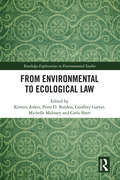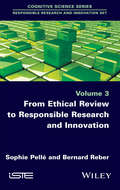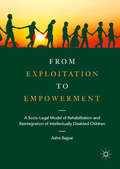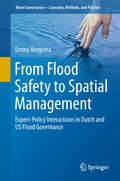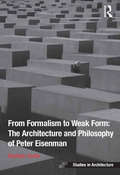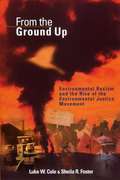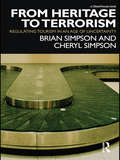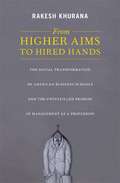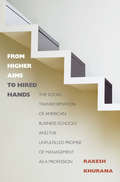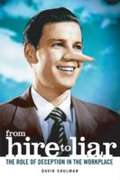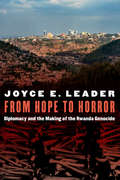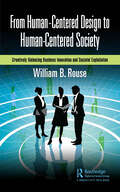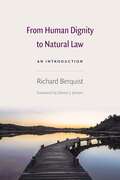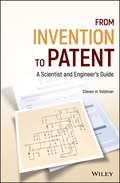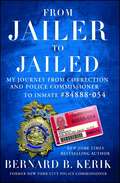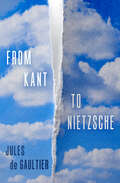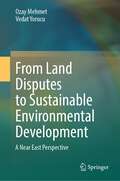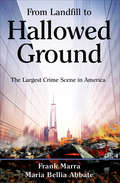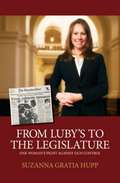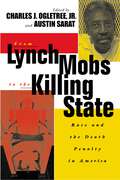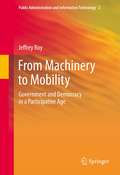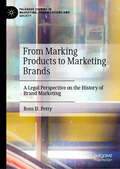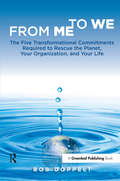- Table View
- List View
From Environmental to Ecological Law (Routledge Explorations in Environmental Studies)
by Kirsten Anker; Peter D. Burdon; Geoffrey Garver; Michelle Maloney; Carla SbertThis book increases the visibility, clarity and understanding of ecological law. Ecological law is emerging as a field of law founded on systems thinking and the need to integrate ecological limits, such as planetary boundaries, into law. Presenting new thinking in the field, this book focuses on problem areas of contemporary law including environmental law, property law, trusts, legal theory and First Nations law and explains how ecological law provides solutions. Written by ecological law experts, it does this by 1) providing an overview of shortcomings of environmental law and other areas of contemporary law, 2) presenting specific examples of these shortcomings, 3) explaining what ecological law is and how it provides solutions to the shortcomings of contemporary law, and 4) showing how society can overcome some key challenges in the transition to ecological law. Drawing on a diverse range of case study examples including Indigenous law, ecological restoration and mining, this volume will be of great interest to students, scholars and policymakers of environmental and ecological law and governance, political science, environmental ethics and ecological and degrowth economics.
From Ethical Review to Responsible Research and Innovation
by Bernard Reber Sophie PelléThe concept of RRI has emerged as a new framework to be used by the European Commission for research projects. It now lies at the core of the Horizon 2020 programme and is designed to replace current assessment practices focused on ethical review. The book will analyse the shift from ethical review to RRI: what remains of the former, what has been gained? Secondly, it makes a critical presentation of existing ethical reviews from the perspectives of moral philosophy and the philosophy of technology. It discusses conceptions of ethical assessment on different levels. Thirdly, this book presents the RRI pillars presented by the European commission, together with their possible relationships to different governance models. Moreover, existing academic literature on RRI, which is not yet extensive, is growing rapidly. Various frameworks highlighting the dimensions of and conditions for responsible research and innovation have been proposed to define RRI. However, in spite of a well-established tradition on the subject in moral theory and philosophy, none of these approaches has investigated the concept of responsibility in depth. Fourthly, and for this reason, the book will provide an analysis of various meanings of responsibility that have been identified in moral theory and will discuss their relevance for RRI in different contexts. It will defend a pluralist approach to responsibility and explore several combinations of responsibilities depending on how these responsibilities are shared in a given context. The book adopts both a theoretical and a practical approach by assessing different participatory devices and analysing a number of research cases.
From Exploitation to Empowerment: A Socio-Legal Model of Rehabilitation and Reintegration of Intellectually Disabled Children
by Asha BajpaiThis book presents the outcomes of a field action project at the Tata Institute of Social Sciences (TISS). Project Chunauti (English translation: Project Challenge) focused on a group of intellectually disabled, orphan children who were survivors of abuse, exploitation and neglect, and describes their journey toward empowerment. It offers a vision and a reproducible, adaptable model for rehabilitation that can foster the social re-integration of intellectually disabled orphans at institutions. As the implementation of laws is especially important for vulnerable groups, the book also outlines a socio-legal approach that not only impacts the children directly, but can also bring about policy level reforms.Project Chunauti was born out of the need to explore options for these children and to set standards for their care, protection, rehabilitation and social re-integration. The core objectives of the project were to provide support and services, including counseling, education, life skills and vocational skills training, as well as medical and psychiatric support to help them overcome the trauma of abuse and exploitation. Its further goal was to train the staff of state-run homes and state authorities, helping them prepare and implement care plans and rehabilitation, combat child sexual abuse and malnutrition, employ positive disciplining, and better understand disabilities. The book also draws on the Project team’s experiences of rolling out the replication process in Maharashtra. This book highlights the role of the courts, media and other stakeholders in the journey towards empowerment and justice. It is a combination of social-work methods, application and implementation of law and legal advocacy, as well as best practices for protecting children’s rights and developing rehabilitation and re-integration projects for intellectually disabled, orphaned children in India. The interventions detailed here provide a reproducible, adaptable model of intervention for children in institutional care across the country.
From Flood Safety to Spatial Management: Expert-Policy Interactions in Dutch and US Flood Governance (Water Governance - Concepts, Methods, and Practice)
by Emmy BergsmaThis book deals with the introduction of a new type of “spatial measures" in flood governance. In contrast to traditional “safety measures" that aim to provide protection against floods by building structural flood defenses such as levees and flood walls, the goal of spatial measures is to reduce the exposure to flood risks by changing the spatial layout of flood-prone areas. By limiting developments and flood-proofing buildings in areas at risk to flooding, investments in structural flood defenses can be circumvented and vulnerabilities reduce. World-wide, spatial measures are gaining attractiveness as a response strategy to increasing flood risks caused by climate change and urbanization. The introduction of spatial measures in flood governance involves more than the simple development of new policies and laws. Research has demonstrated that the implementation of spatial measures can have huge implications for how costs and responsibilities are divided between different levels of governance and between public and private actors, changing the whole organization behind flood governance. Both for the effectiveness and for the legitimacy of spatial flood governance strategies, it is important that these distributive implications are well understood. This book describes the introduction of spatial measures in the context of two very different delta countries: the Netherlands and the United States. In the United States, a spatial flood governance strategy was already developed in de mid-20th century whereas in the Netherlands, a safety paradigm institutionalized over the course of the 20th century and spatial measures have only recently been introduced. By analyzing the science-policy interactions underlying the implementation of spatial measures in both countries, this book shows how under the influence of different types of experts (engineers in the Netherlands and social geographers in the United States) different spatial flood management strategies emerged with different distributive implications, each with its own challenges for effectiveness and legitimacy.
From Formalism to Weak Form: The Architecture and Philosophy of Peter Eisenman
by Stefano CorboPeter Eisenman is one of the most controversial protagonists of the architectural scene, who is known as much for his theoretical essays as he is for his architecture. While much has been written about his built works and his philosophies, most books focus on one or the other aspect. By structuring this volume around the concept of form, Stefano Corbo links together Eisenman’s architecture with his theory. From Formalism to Weak Form: The Architecture and Philosophy of Peter Eisenman argues that form is the sphere of mediation between our body, our inner world and the exterior world and, as such, it enables connections to be made between philosophy and architecture. From the start of his career on, Eisenman has been deeply interested in the problem of form in architecture and has constantly challenged the classical concept of it. For him, form is not simply a cognitive tool that determines a physical structure, which discriminates all that is active from what is passive, what is inside from what is outside. He has always tried to connect his own work with the cultural manifestations of the time: firstly under the influence of Colin Rowe and his formalist studies; secondly, by re-interpreting Chomsky’s linguistic theories; in the 80’s, by collaborating with Derrida and his de-constructivist approach; more recently,by discovering Henri Bergson's idea of Time. These different moments underline different phases, different projects, different programmatic manifestos; and above all, an evolving notion of form. Taking a multi-disciplinary approach based on the intersections between architecture and philosophy, this book investigates all these definitions and, in doing so, provides new insights into and a deeper understanding of the complexity of Eisenman’s work.
From Goods to a Good Life: Intellectual Property and Global Justice
by Madhavi SunderMost scholarship on intellectual property considers this law from the standpoint of law and economics. Under this conventional wisdom, intellectual property is simply a tool for promoting innovative products, from iPods to R2D2. In this highly original book Madhavi Sunder calls for a richer understanding of intellectual property law's effects on social and cultural life. Intellectual property does more than incentivize the production of more goods. This law fundamentally affects the ability of citizens to live a good life. Intellectual property law governs the abilities of human beings to make and share culture, and to profit from this enterprise in a global Knowledge economy. This book turns to social and cultural theory to more fully explore the deep connections between cultural production and human freedom.
From The Ground Up: Environmental Racism and the Rise of the Environmental Justice Movement
by Luke W. Cole Sheila R. FosterWhen Bill Clinton signed an Executive Order on Environmental Justice in 1994, the phenomenon of environmental racism--the disproportionate impact of environmental hazards, particularly toxic waste dumps and polluting factories, on people of color and low-income communities--gained unprecedented recognition. Behind the President's signature, however, lies a remarkable tale of grassroots activism and political mobilization. Today, thousands of activists in hundreds of locales are fighting for their children, their communities, their quality of life, and their health. From the Ground Up critically examines one of the fastest growing social movements in the United States, the movement for environmental justice. Tracing the movement's roots, Luke Cole and Sheila Foster combine long-time activism with powerful storytelling to provide gripping case studies of communities across the U. S--towns like Kettleman City, California; Chester, Pennsylvania; and Dilkon, Arizona--and their struggles against corporate polluters. The authors effectively use social, economic and legal analysis to illustrate the historical and contemporary causes for environmental racism. Environmental justice struggles, they demonstrate, transform individuals, communities, institutions and even the nation as a whole.
From Heritage to Terrorism: Regulating Tourism in an Age of Uncertainty
by Brian Simpson Cheryl SimpsonCritical in style, From Heritage to Terrorism: Regulating Tourism in an Age of Uncertainty examines the law and its role in shaping and defining tourism and the tourist experience. Using a broad range of legal documents and other materials from a variety of disciplines, it surveys how the underlying values of tourism often conflict with a concern for human rights, cultural heritage and sustainable environments. Departing from the view that within this context the law is simply relegated to dealing the ‘hard edges’ of the tourist industry and tourist behaviour, the authors explore: the ways that the law shapes the nature of tourism and how it can do this the need for a more focused role for law in tourism the law’s current and potential role in dealing with the various tensions for tourism in the panic created by the spread of global terrorism. Addressing a range of fundamental issues underlying global conflict and tourism, this thoroughly up-to-date and topical book is an essential read for all those interested in tourism and law.
From Higher Aims to Hired Hands: The Social Transformation of American Business Schools and the Unfulfilled Promise of Management as a Profession
by Rakesh Khurana"I have been waiting for years for someone to write the definitive institutional history of U. S. management education, and this is it. From the standpoint of most analytic definitions of 'professional,'the term 'professional manager' is enigmatic, even oxymoronic. Rakesh Khurana's thorough, insightful, provocative, and courageous history of business education explains how this term came to make practical and cultural sense to a generation of Americans, and how its logic has been undermined in the past thirty years. "From Higher Aims to Hired Hands" is an exemplary work of institutional analysis, combining first-rate historiography with outstanding social-science scholarship. It will be essential reading for business historians, students of management and organizations, and faculty, administrators, and thoughtful students at America's business schools. "--Paul DiMaggio, Princeton University" "From Higher Aims to Hired Hands" is a tour de force. With profound depth and sweeping scope, Rakesh Khurana analyses the rise and potential fall of a uniquely American institution--one that has influenced management education throughout the world. His book contributes significantly to explaining how managerial capitalism could go awry and how to restore the moral underpinnings that would make management the profession of leadership. In addition to offering fascinating history lessons based on exhaustive research, Khurana adds new twists to institutional theory and points to future directions for educational practice. "--Rosabeth Moss Kanter, Harvard Business School, author of "The Change Masters, Confidence," and "America the Principled: 6 Opportunities for Becoming a Can-Do Nation OnceAgain" "This panoramic portrait of the origins and ramifications of American business education is quite remarkable, rich in detail, powerful in the marshaling of evidence, and provocative in its claims. Khurana writes with confidence, authority, and erudition. "--Walter Powell, Stanford University "This is a wonderful and important book for anyone interested in business education. There is a tendency for those of us involved in business education to think that we understand the dynamics of our industry and that there is little new that we can learn. How wrong such a judgment would be. In providing a sociological understanding of the origins of business education and the professionalization of management, this book prompts deep reflection about the state of management today and offers real insight into the challenges of elevating the standards of this particular profession. "--Joel Podolny, dean of Yale School of Management
From Higher Aims to Hired Hands: The Social Transformation of American Business Schools and the Unfulfilled Promise of Management as a Profession
by Rakesh KhuranaIs management a profession? Should it be? Can it be? This major work of social and intellectual history reveals how such questions have driven business education and shaped American management and society for more than a century. The book is also a call for reform. Rakesh Khurana shows that university-based business schools were founded to train a professional class of managers in the mold of doctors and lawyers but have effectively retreated from that goal, leaving a gaping moral hole at the center of business education and perhaps in management itself. Khurana begins in the late nineteenth century, when members of an emerging managerial elite, seeking social status to match the wealth and power they had accrued, began working with major universities to establish graduate business education programs paralleling those for medicine and law. Constituting business as a profession, however, required codifying the knowledge relevant for practitioners and developing enforceable standards of conduct. Khurana, drawing on a rich set of archival material from business schools, foundations, and academic associations, traces how business educators confronted these challenges with varying strategies during the Progressive era and the Depression, the postwar boom years, and recent decades of freewheeling capitalism. Today, Khurana argues, business schools have largely capitulated in the battle for professionalism and have become merely purveyors of a product, the MBA, with students treated as consumers. Professional and moral ideals that once animated and inspired business schools have been conquered by a perspective that managers are merely agents of shareholders, beholden only to the cause of share profits. According to Khurana, we should not thus be surprised at the rise of corporate malfeasance. The time has come, he concludes, to rejuvenate intellectually and morally the training of our future business leaders.
From Hire to Liar: The Role of Deception in the Workplace
by David ShulmanThis book offers a sociological study of the rationales for, and methods of, workplace deception. The author begins by presenting an ethnographic analysis of private detectives' routine use of deception as an officially-sanctioned component of their work. He then uses interviews and case-studies to show how similar strategies are used in a variety of other work environments. The author discusses the justification and effects of workplace deception on both workers and employers.
From Hope to Horror: Diplomacy and the Making of the Rwanda Genocide
by Joyce E. LeaderAs deputy to the U.S. ambassador in Rwanda, Joyce E. Leader witnessed the tumultuous prelude to genocide—a period of political wrangling, human rights abuses, and many levels of ominous, ever-escalating violence. From Hope to Horror offers her insider&’s account of the nation&’s efforts to move toward democracy and peace and analyzes the challenges of conducting diplomacy in settings prone to—or engaged in—armed conflict. Leader traces the three-way struggle for control among Rwanda&’s ethnic and regional factions. Each sought to shape democratization and peacemaking to its own advantage. The United States, hoping to encourage a peaceful transition, midwifed negotiations toward an accord. The result: a revolutionary blueprint for political and military power-sharing among Rwanda&’s competing factions that met categorical rejection by the &“losers&” and a downward spiral into mass atrocities. Drawing on the Rwandan experience, Leader proposes ways diplomacy can more effectively avert the escalation of violence by identifying the unintended consequences of policies and emphasizing conflict prevention over crisis response. Compelling and expert, From Hope to Horror fills in the forgotten history of the diplomats who tried but failed to prevent a human rights catastrophe.
From Human-Centered Design to Human-Centered Society: Creatively Balancing Business Innovation and Societal Exploitation
by William B. RouseA human-centered society creatively balances investments in sources of innovation, while also governing in a manner that eventually limits exploitation by originators once innovations have proven their value in the marketplace, broadly defined to include both private and public constituencies. The desired balance requires society to invest in constituencies to be able to create innovations that provide current and future collective benefits, while also assuring society provides laws, courts, police, and military to protect individual rights to life, liberty, and the pursuit of happiness. The balance addresses collectivism vs. individualism. Collectivism emphasizes the importance of the community. Individualism, in contrast, is focused on the rights and concerns of each person. Unity and selflessness or altruism are valued traits in collectivist cultures; independence and personal identity are central in individualistic cultures. Collectivists can become so focused on collective benefits that they ignore sources and opportunities for innovation. Individualists can tend to invest themselves, almost irrationally, in ideas and visions, many of which will fail, but some will transform society. Collectivists need to let individualists exploit their successful ideas. Individualists need to eventually accept the need to provide collective benefits. This book addresses the inherent tension underlying the pursuit of this balance. It has played a central role in society at least since the Industrial Revolution (1760–1840). Thus, the story of this tension, how it regularly emerges, and how it is repeatedly resolved, for better or worse, is almost a couple of centuries old. Creating a human-centered society can be enabled by creatively enabling this balance. Explicitly recognizing the need for this balance is a key success factor. This book draws upon extensive experiences within the domains of transportation and defense, computing and communications, the Internet and social media, health and wellness, and energy and climate. Balancing innovation and exploitation takes varying forms in these different domains. Nevertheless, the underlying patterns and practices are sufficiently similar to enable important generalizations.
From Human Dignity To Natural Law: An Introduction
by Richard Berquist Steven J. JensenFrom Human Dignity to Natural Law shows how the whole of the natural law, as understood in the Aristotelian Thomistic tradition, is contained implicitly in human dignity. Human dignity means existing for one's own good (the common good as well as one's individual good), and not as a mere means to an alien good. But what is the true human good? This question is answered with a careful analysis of Aristotle's definition of happiness. The natural law can then be understood as the precepts that guide us in achieving happiness. To show that human dignity is a reality in the nature of things and not a mere human invention, it is necessary to show that human beings exist by nature for the achievement of the properly human good in which happiness is found. This implies finality in nature. Since contemporary natural science does not recognize final causality, the book explains why living things, as least, must exist for a purpose and why the scientific method, as currently understood, is not able to deal with this question. These reflections will also enable us to respond to a common criticism of natural law theory: that it attempts to derive statements of what ought to be from statements about what is.
From Invention to Patent: A Scientist and Engineer's Guide
by Steven H. VoldmanInvention and patents continues to be an important issue in technology and our global economy. Invention and Patenting provides a clear picture of how to be a prolific inventor, to understand patents, and the patent process. It provides an illuminating insight into the writing of invention disclosures to patents from the submission process to final drafts. The book shows how to communicate effectively with patent lawyers and patent examiners, teaching the language of “legalese.” This book is unique in covering both the early invention process to final patent drafting to provide high quality patents in technologies. Key features include: How to become an inventor, how to invent, to what is invention; How to write an invention disclosure to writing a patent; Examples of utility, design, and plant patents; How to prepare the background section, brief listing of figures, detailed description of the invention, claims, abstract to artwork; Using patent search engines; Writing independent and dependent claims; Analyzing office actions of the US and European patent offices; How to write an office action response and amending claims; and, Examples of Office Action responses, preliminary amendments, to notice of allowance response; Invention and Patenting is the first book by an engineer and inventor from a technologist’s point of view. It is an essential reference for engineers and inventors. It is also useful for graduate and undergraduate students in technology and the sciences.
From Jailer to Jailed
by Bernard B. KerikThe controversial New York City police commissioner and bestselling author of The Lost Son shares the story of his fall from grace and the effects of his incarceration on his views of the American justice system.Bernard Kerik was New York City's police commissioner during the 9/11 attacks, who became an American hero as he led the NYPD through rescue and recovery efforts of the World Trade Center. His résumé as a public servant is long and storied, and includes honors from President Ronald Reagan, Queen Elizabeth II, and the NYPD's Medal for Valor for saving his partner in a gun battle. In 2004, Kerik was nominated by President George W. Bush to head the US Department of Homeland Security. Now, he is a former Federal Prison Inmate known as #84888-054. Convicted of tax fraud and false statements in 2007, Kerik was sentenced to four years in federal prison. Now for the first time, in this hard-hitting, raw and oftentimes politically incorrect memoir, he talks candidly about his time on the inside: the torture of solitary confinement, the abuse of power, the mental and physical torment of being locked up in a cage, the powerlessness. With his newfound perspective, Kerik makes a plea for change and illuminates why our punishment system doesn't always fit the crime. In this extraordinary memoir, Kerik offers a riveting, one-of-a-kind perspective on the American penal system as he details life on the inside with the experience of an acclaimed Correction Commissioner from the outside. With astonishing candor, bravery, and insider's intelligence, Bernard Kerik shares his fall from grace to incarceration, and turns it into an impassioned and singularly insightful rallying cry for criminal justice reform in a nation that he devoted his life to serving and protecting.
From Justice to Protection
by Miguel KottowIn most developed countries, the epidemiological disease profile has changed from infectious to degenerative, causing major alterations in epidemiological thinking and public health policies. Less developed nations have to deal with a more complex situation, because social disparities create highly unequal health conditions, the affluent being afflicted by degenerative conditions, whereas the poorer social segments continue to suffer infectious diseases, but also begin to feel the effects of chronic illness. At the turn of the 21st century, equity in health care is not being served, and social justice has lost credibility as a conceptual driving force of public health policies. Rampant injustice confirms that theories, reality and suggested practices of just social orders are flawed, leaving the needy without help or hope in a world of flagrant ethical inadequacy. And yet, mainstream bioethics loses meaning and relevance as it clings to the principle of justice and hails such concepts as global justice and universal health-care equity, misleadingly focusing on justice as a desideratum. This book pleads for an urgent turn towards directly addressing injustice as a reality that requires pressingly needed arguments and proposals to inspire realistic public health policies and programs based on an ethics of protection. Ever since Hobbes, all shades of political philosophy accept that the basic obligation of the ruling power is to protect its subjects. The ethics of protection emphasizes aiding the needy and the disempowered in obtaining access to basic goods and services related to health-care. Public health is called upon to fulfill protective obligations to guarantee disease prevention and medical services to the population, taking special care to safeguard those unable to cover their health-care needs in market-oriented medical services and institutions. The bioethics of protection developed in this text presents specific and explicit guide-lines to assure that protective public health actions be efficacious (problem-solving), efficient (sustainable cost/benefit relation) and ethically sound (respecting human rights and the common weal). These guide-lines are designed to give ethical support and justification to public health policies even when they require some unavoidable limitations of individual autonomy to promote social health benefits.
From Kant to Nietzsche
by Jules de Gaultier&“Schopenhauer contributed the concept of the will-to-live; Nietzsche that of the will-to-power; and de Gaultier that of the will-to-illusion.&” —Wilmot E. Ellis Can you construct your own reality? What if you don&’t trust your senses, but you want to live a happy, productive life? How should you make moral decisions? What do you believe to be true? Do you believe in a supreme being? How do you decide your moral compass? This work by the author of Le Bovarysme treats the tendency to think of things other than they are as a living source of art. Jules de Gaultier sees this sort of behavior not as a moral or ethical problem, but an aesthetic problem. His metaphysical position has a long and complicated history which can be traced back to the philosophical musings of Kant, Schopenhauer, and Nietzsche. This book was his first published work, and serves as a thought-provoking introduction to his philosophy.
From Land Disputes to Sustainable Environmental Development: A Near East Perspective
by Ozay Mehmet Vedat YorucuThis book is written to transform land disputes toward win-win outcomes utilizing the latest sustainable development theory. Land has always been a source of conflict, a contest of competing homelands and ideologies, but it can also act as an agency of peace-making, promoting economic and social development. This dualism will be the theme of this book as there is a dearth of studies exclusively focused on land. The book's coverage is comprehensive, examining land and property disputes with case studies in modern times along with a problem-solving approach utilizing such economic theorems as Location and Growth Poles theories. The UN’s Sustainable Development Goals will be used as our over-arching framework. The overall aim of the book is to transform land disputes toward win-win outcomes utilizing latest sustainable development theory.
From Landfill to Hallowed Ground: The Largest Crime Scene in America
by Frank Marra Maria Bellia AbbateAn NYPD sergeant shares his experiences in the tragic aftermath of 9/11 and the tireless search for remains among the debris of the Twin Towers.The morning of September 11, 2001, began like any other Tuesday for police Sergeant Frank Marra. He woke up early, brewed his coffee, and got his son Anthony ready for kindergarten. Then a shocking image interrupted televised broadcasts nationwide: the South Tower of the World Trade Center was engulfed in flames and smoke. Sergeant Marra stared in shock at what would become the largest crime scene he would ever investigate.Marra spent months at the Staten Island Landfill, where the 1.6 million tons of debris was searched for any form of evidence that could help identify the victims, including the remains of those buried beneath. Officers and volunteers worked tirelessly, often at great cost to themselves, to bring closure for so many grieving families. This heartrending story gives readers a rare and intimate glimpse into the days and months following the attack on September 11, and the stories that echo from &“The Hill&”—the hallowed ground of those who perished on that fateful day.
From Luby's To The Legislature: One Woman's Fight Against Gun Control
by Suzanna Gratia HuppOn October 16, 1991, Suzanna Gratia Hupp witnessed the tragic shooting of 23 people at Luby's Cafeteria in Killeen, Texas, among them her parents. Ironically she had decided against carrying a small revolver--that could have dramatically changed the day's events--in her purse that day out of a fear of losing her chiropractor's license if caught possessing a weapon. In this autobiography, she chronicles her evolution from a small-town chiropractor into a national icon for the right to armed self-defense. Her transformation into a high-profile, gun-rights activist began when her impassioned calls for the right of citizens to carry guns for self-protection thrust her into the middle of the gun-control debate. She repeatedly testified under oath against the ineffectiveness of gun-control laws that, in her opinion, disarmed law-abiding citizens, making them potential victims of criminals who did not obey the law. This position on gun legislation paved the way for a decade-long tenure as a member of the Texas House of Representatives, where, in addition to championing Second Amendment and privacy rights, she served as a member of the House Rural and Veterans and Military Affairs Caucuses, Chair of the House Select Committee on Child Welfare and Foster Care, and Chair of the Human Services Committee.
From Lynch Mobs to the Killing State: Race and the Death Penalty in America (The Charles Hamilton Houston Institute Series on Race and Justice #6)
by Charles J. Ogletree, Jr., and Austin SaratSituates the linkage between race and the death penalty in the history of the U.S.Since 1976, over forty percent of prisoners executed in American jails have been African American or Hispanic. This trend shows little evidence of diminishing, and follows a larger pattern of the violent criminalization of African American populations that has marked the country's history of punishment.In a bold attempt to tackle the looming question of how and why the connection between race and the death penalty has been so strong throughout American history, Ogletree and Sarat headline an interdisciplinary cast of experts in reflecting on this disturbing issue. Insightful original essays approach the topic from legal, historical, cultural, and social science perspectives to show the ways that the death penalty is racialized, the places in the death penalty process where race makes a difference, and the ways that meanings of race in the United States are constructed in and through our practices of capital punishment.From Lynch Mobs to the Killing State not only uncovers the ways that race influences capital punishment, but also attempts to situate the linkage between race and the death penalty in the history of this country, in particular the history of lynching. In its probing examination of how and why the connection between race and the death penalty has been so strong throughout American history, this book forces us to consider how the death penalty gives meaning to race as well as why the racialization of the death penalty is uniquely American.
From Machinery to Mobility
by Jeffrey RoyThe Westminster-stylized model of Parliamentary democratic governance is out of step with today's digitally and socially networked world. The resulting context for public sector governance brings both promise and peril - with profound consequences for public servants, elected officials, and citizens alike. This book presents a timely and thorough examination of the main sources of tension between the political and administrative foundations of the traditional state apparatus, commonly referred to as 'machinery', and newly emerging alternative governance mindsets and mechanisms driven by the advent of 'mobility'. Consistent with the emergence of Government 2.0, some of the critical technological and organizational dimensions of mobility include openness, cloud computing, privacy and security, and social media. Furthermore, a more informed, educated, and connected citizenry creates new pressures and opportunities for public engagement, particularly online. Blending conceptual and empirical perspectives from Canada and many other jurisdictions around the world, this book aims to provide scholars, students, and practitioners of democratic and public sector governance with fresh insight into both the prospects for reform and the critical choices that lie ahead for governments and citizens in an increasingly mobile and participative age.
From Marking Products to Marketing Brands: A Legal Perspective on the History of Brand Marketing (Palgrave Studies in Marketing, Organizations and Society)
by Ross D. PettyThis book examines the historical evolution from marking or branding products for ownership purposes to branding products in order to promote the brand itself. In the extreme, some modern brands so strongly promote their brand image or personality that there is little emphasis on promoting the branded products themselves. Central to this evolution is the development and protection of brand identifiers, such as names, logos, and more, as well as the development of registration and conflict-resolution systems to resolve disputes regarding brand identifier similarities. The author meticulously navigates the historical evolution of brand marketing, elucidating the manner in which this practice has evolved over time. To get a sense of how much brand marketing has grown, he examines advertising expenditures, the scholarly and professional literature, a few case studies, and the growing number of brand identifier registrations and disputes. He examines several legal areas including trademarks, unfair competition, copyrights, design patents and even antitrust law. In modern times, the legal system not only enables brand marketing but sets limits on it as well. The book concludes by examining some modern developments that are testing the limits. Catering to researchers vested in the realms of advertising and marketing history as well as law, this landmark text provides a thorough survey of brand marketing and its regulatory landscape.
From Me to We: The Five Transformational Commitments Required to Rescue the Planet, Your Organization, and Your Life
by Bob DoppeltIn From Me to We: The Five Transformational Commitments Required to Rescue the Planet, Your Organization, and Your Life, systems change expert Bob Doppelt reveals that most people today live a dream world, controlled by false perceptions and beliefs. The most deeply held illusion is that all organisms on Earth, including each of us, exist as independent entities. At the most fundamental level, the change needed to overcome our misperceptions is a shift from focusing only on "me" – our personal needs and wants – to also prioritizing the broader "we": the many ecological and social relationships each of us are part of, those that make life possible and worthwhile. Research shows that by using the techniques described in this book this shift is possible – and not that difficult to achieve. From Me to We offers five transformational "commitments" that can help you change your perspective and engage in activities that will help resolve today's environmental and social problems. Not coincidentally, making these commitments can improve the quality of your life as well. Bob Doppelt's latest book is a wake-up call to the creed of individualism. He calls for recognition of the laws of interdependence, cause and effect, moral justice, trusteeship, and free will. The book will be essential to all of those interested in how we can create and stimulate a sea change in how to enable the necessary behavioral change we need to deal with the myriad environmental and social pressures consuming the planet.
